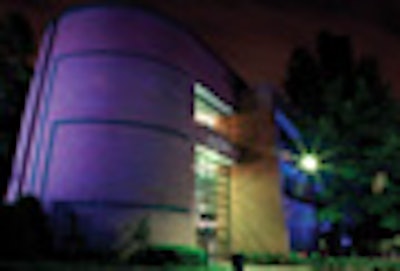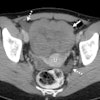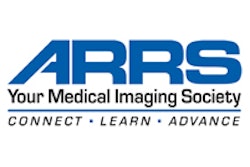
A streak of favorable research outcomes, in particular the preliminary National CT Colonography Trial results released in September, seems to be coinciding with expanded training options for virtual colonoscopy (VC or CT colonography [CTC]).
In North America and across the pond, courses are filling up with radiologists and others looking for reading tips, hands-on experience, CME credits, and the occasional certificate of proficiency. Here are a few courses on our radar screen for spring/summer 2008 -- and a story or two about them for good measure. Potential trainees are advised to sign up soon or miss out.
ACR
The Reston, VA-based American College of Radiology (ACR) is gearing up for three VC courses of its own this spring, to be held at the Hyatt Regency Reston on March 17-18 (course full), April 17-18, and June 9-10, according to ACR education center director Vinay Sandhir, who spoke with AuntMinnie.com by telephone.
The courses were to be held at the new ACR Education Center. But as it turns out, the 10,000-sq-ft state-of-the-art center isn't quite ready for its close-up, hence the relocation of courses, probably through June, to the nearby Hyatt.
 |
| The American College of Radiology's new education center in Reston, VA, incorporates state-of-the-art teaching methods. Image courtesy of ACR. |
"With all the technology and things we're putting in there we're a little behind schedule," said Sandhir, who nevertheless promised that everything that makes the new education center unique will be up and running at the Hyatt, including the "hardware, software, and case-engine methodology we're using at the education center."
The case engine is the ACR's proprietary learning methodology, designed to measure performance as a series of cases is completed. Learners navigating the curriculum must master the learning criteria before progressing to the next topic, according to the ACR.
"There's still a chance of moving in (to the education center) late April -- we're doing a tour for our (ACR) membership in March -- but we wanted to make sure the technical infrastructure was in place" before committing to the space, Sandhir said.
All three courses will be led by Dr. Matthew Barish from Boston University Medical Center in Massachusetts. Joining him in March will be Dr. Jorge Soto from Beth Israel Deaconess Medical Center in Boston, and Dr. Abraham Dachman from the University of Chicago in Illinois. In April, Barish will be joined by Dr. Todd Fibus from the Atlanta VA Medical Center in Decatur, GA, and Dr. Mark Klein from Washington Radiology Associates in Washington, DC. The larger June course, with room for 40 participants, will be led by Barish with help from Soto, Klein, and Todd.
The program includes instruction on the techniques needed to perform CTC successfully, interpretation methods, current research initiatives, regulatory issues, and the reimbursement environment.
Participants will earn 15 category 1 CME credits. Those who successfully complete the course and who finish 50 supervised CTC cases correctly will receive a certificate of proficiency (COP) stating that they've met ACR Practice Guideline requirements for the performance of VC in adults.
For more information on the ACR courses, click here.
VC training in Victoria
|
VC screening in Victoria Surveying the colon screening landscape in Canada three years ago, radiologist Dr. John Mathieson didn't much like what he saw. There was no national colon screening, and there still isn't, he told AuntMinnie.com by telephone. Colorectal screening was available in a few provinces. Alberta, Manitoba, and Ontario were doing mass fecal occult blood test (FOBT) exams, following up on positive tests with conventional colonoscopy, according to Mathieson, the medical director and head of medical imaging for Vancouver Island Health Authority (VIHA) in British Columbia. But considering FOBT's low sensitivity (15% to 30%) for detecting colon cancer and screening colonoscopy's low yield in the general population, Mathieson wanted something better for island residents. He knew what that something was, too, having attended Dr. David Vining's original presentation on noninvasive colon screening using "virtual reality" (now VC) at the Society of Gastrointestinal Radiologists meeting in Hawaii in February 1994, and having followed VC's progress avidly ever since. "I've felt for some time (that VC) is something we should be doing," he said. "When I arrived in Victoria, there was such a huge wait list for routine colonoscopy" -- over two years for asymptomatic individuals of screening age, he said. "I said to the government that if 80% to 90% of the people having colonoscopy are having nothing significant, then 80% to 90% of the colonoscopies are a waste of time," he said. "And most of the (diminutive) polyps they take out are not worthwhile." Long story short: Mathieson applied for and received a Canadian government "health innovations" grant to perform VC in Victoria, receiving the initial installment of $1.5 million Canadian in 2006. Aiming to hit the lowest-yield, asymptomatic over-50 population first, Mathieson's goal is to perform 1,800 VC exams with the first batch of money. The team has already completed 1,400 VC exams, and analyzed data from the first 1,000. "We've done pretty well in a year and half," he said. "We're doing 15 to 20 (exams) a day, Monday through Friday, primary 3D read (V3D Colon software, Viatronix, Stony Brook, NY) with 2D confirmation. It's the only way to go," he said. In those first 1,000 patients, the group has found 135 polyps 6 mm and larger, with an 18% positive exam rate. Four percent of patients had frank cancers, and 4% had polyps 6 mm and larger. "We've eliminated 80% of the colonoscopies and eliminated 500 biopsies of diminutive polyps," Mathieson said. Today, armed with five 64-slice CT scanners on the island, there's a need for more VC readers. A training course to be taught by Dr. Perry Pickhardt and Dr. David Kim from the University of Wisconsin Medical Center in Madison will help address this need. -- EB |
A two-day CTC training course this spring, to be taught by Dr. Perry Pickhardt and Dr. David Kim from the University of Wisconsin Medical Center in Madison, will cover the clinically proven CTC techniques Pickhardt and colleagues developed in the trial later reported in the New England Journal of Medicine (December 4, 2003, Vol. 349:23, pp. 2191-2120).
The hands-on CME course offers 18 hours of category 1 CME credit, and is available for both U.S. and Canadian physicians, as well as any interested CT technologists, nurse practitioners, and CTC program coordinators, according to Pickhardt. All aspects of CTC program setup, administration, and interpretation will be covered in detail.
And, of course, trainees get to visit lovely Victoria in the spring.
For more information on the Victoria sessions, click here. A repeat course will be held in Chicago, August 8-9. For more information, click here.
CTC for gastroenterologists
Gastroenterologists are getting on board with VC in a big way. Registration is completely full for the March 7-8 CTC informational course sponsored by the American Gastroenterological Association (AGA) in Bethesda, MD.
Entitled "CT Colonography -- What Gastroenterologists Need to Know: Imaging and the Digestive Disease Practice," the course offers 11.5 category I CME credits for the two-day program.
"This is not a training course, but rather an introduction to what CT colonography has to offer," explained co-chair Dr. Elizabeth McFarland, a radiologist at St. Lukes Center for Diagnostic Imaging in Chesterfield, MO. "The course is designed to allow gastroenterologists to understand what is involved with CT colonography: review of data, current uses, and overview of image interpretation."
Although course registration is closed, and the waiting list is long, the society is planning Webcasts of the meeting for its members. A repeat course is also being planned for late summer or fall 2008, according to Jennifer Conte, senior director of clinical practice and reimbursement issues. For more information visit the AGA Web site or call member services at 301-941-2651.
ESGAR hosts sessions in Europe
This year's European Society of Gastrointestinal and Abdominal Radiology (ESGAR) CTC workshops are directed by Dr. Andrea Laghi from the University of Rome "La Sapienza."
ESGAR's newly expanded CTC teaching committee includes leading CTC researchers Dr. Steve Halligan and Dr. Stuart Taylor from the U.K., Dr. Jaap Stoker from the Netherlands, Dr. Philippe Lefere from Belgium, and Dr. Patrick Rogalla from Germany, Laghi told AuntMinnie.com.
"The aim of the course is to provide a deep and intense training on CTC using a two-day format," Laghi wrote in an e-mail to AuntMinnie.com. "Day one is devoted to lectures mixed with demonstrations on the workstations performed by the expert. Day two is the real hands-on training, with the trainees having the possibility to use several workstations from virtually all the major vendors."
Training is guided by the faculty and performed under the careful supervision of tutors in the room who are available for questions and workstation help. Advanced training specialists from the different vendors are onsite at each session. A total of 740 individuals have completed training since CTC instruction began in 2003.
Training is performed using a database of around 70 colonoscopy-controlled cases provided by the different centers of the faculty. The database has been recently updated with data from 64-slice CT scanners. The course will be held in Vigo, Spain, on April 10-12 (more information) and in Berlin on September 11-12 and September 12-13(more information).
Other sessions
The Reston, VA-based Society of Computed Body Tomography and Magnetic Resonance (SCBT-MR) will present "State of the Art CT & MR and Cardiac CT With Case Review" March 30 to April 4 in Charleston, SC. Leading VC researchers will be on hand for the multispecialty course.
The GE CT Masters Series: Virtual Colonoscopy will be held April 7-8 in Waukesha, WI. Sponsored by GE Healthcare of Chalfont St. Giles, U.K., the course is focused on learning how to perform and interpret virtual colonoscopy examinations and how to set up and promote a virtual colonoscopy clinical practice. Click here for more information.
The American Roentgen Ray Society (ARRS) of Leesburg, VA, will sponsor "Virtual Colonoscopy: A Practice-Based Course With 60 Case Reads" from June 27-28 at the Hyatt Regency in Chicago. Faculty will include Dr. Abraham Dachman, Dr. Perry Pickhardt, and Dr. Michael Macari, who is from NYU Medical Center in New York City.
A training course sponsored by Boston University School of Medicine will be held as part of the 9th International Symposium on Virtual Colonoscopy at the Fairmont Copley Plaza Hotel in Boston on October 27-29.
For courses not included in this article, be sure to revisit the listings in AuntMinnie.com's Virtual Colonoscopy Digital Community.
By Eric Barnes
AuntMinnie.com staff writer
March 7, 2008
Related Reading
Careful reading boosts virtual colonoscopy results, July 26, 2007
ACR plans leading role in virtual colonoscopy education, August 13, 2007
Gastroenterologists plan to perform VC, January 28, 2007
VC experts have an edge over less experienced readers, March 8, 2005
VC researchers urge more training, October 17, 2005
Copyright © 2008 AuntMinnie.com




















